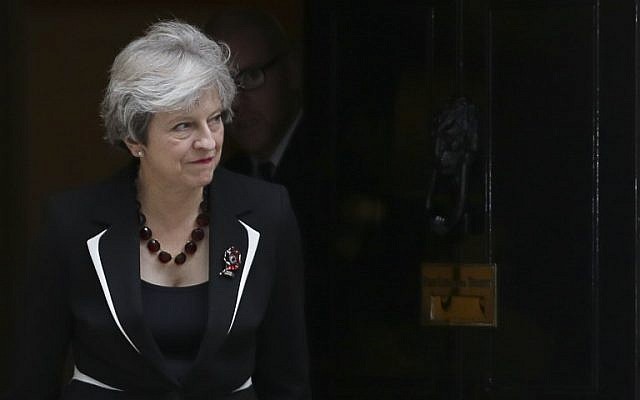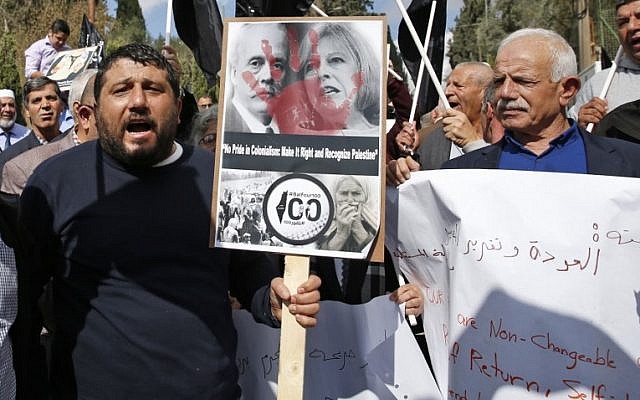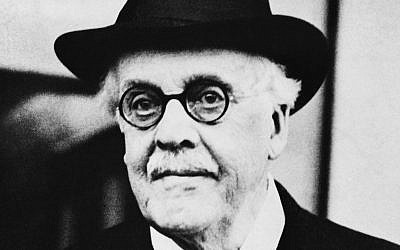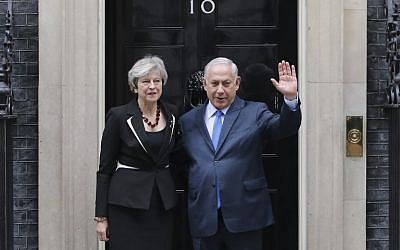In speech underlining pride for UK role in establishment of Israel, Theresa May slams boycott efforts, a ‘new and pernicious form of anti-Semitism’

British Prime Minister Theresa May on Thursday said she would “absolutely not” apologize for the 1917 Balfour Declaration which paved the way for the establishment of the “most extraordinary” State of Israel, while noting that the document’s vision of Jewish-Arab coexistence remained “unfinished business.”
In a speech marking the centenary of the declaration, May was glowing in her praise of the Jewish state, describing it as a “true start-up nation” and a “a symbol of openness, as a thriving democracy; and a beacon to the world in upholding the rights of women and members of the LGBT community.”
The address — which was closed to the press, but released in a transcript — also saw May come out strongly against the boycott movement against Israel, while linking anti-Israel sentiment to a “new and pernicious form of anti-Semitism.”
“We are proud of our pioneering role in the creation of the State of Israel,” May told a London dinner marking the 100th anniversary of the declaration.

Balfour’s landmark document “was a letter that remains very sensitive for many people today – but it was not ignorant of those sensitivities,” May said, emphasizing its explicit call to uphold the civil rights of all the non-Jewish communities residing in the country.
“So when some people suggest we should apologize for this letter, I say absolutely not,” she asserted.
Signed on November 2, 1917 by the UK’s then foreign secretary, Arthur James Balfour, the declaration announced his government’s intention to establish “a national home for the Jewish people” in the Land of Israel.
It was seen as giving the Zionist movement official recognition and backing on the part of a major power, on the eve of the British conquest of the then-Ottoman territory of Palestine.
In recent weeks, the Palestinians have vehemently protested the British government’s decision to mark the Balfour Declaration with pride, calling on London to apologize for the document and recognize a Palestinian state.
Writing in the British daily The Guardian on Wednesday, Palestinian Authority President Mahmoud Abbas argued that the Balfour Declaration was responsible for setting off a century of tragic events for the Palestinians. He called on Britain to recognize a Palestinian state on the 1967 lines with East Jerusalem as its capital, saying such a move would “go some way towards fulfilling the political rights of the Palestinian people.”

In her address, the British prime minister also noted that “sadly, Balfour remains unfinished business – as his fundamental vision of peaceful co-existence has not yet been fulfilled.” She voiced support for a two-state solution, underlining that the Israelis and Palestinians would need to make compromises, on settlements and incitement, respectively.
“There will need to be compromises from each side if we are to have a realistic chance of achieving this goal — including an end to the building of new settlements and an end to Palestinian incitement too,” she said.
“But as we work together towards Balfour’s vision of a peaceful co-existence we must be equally clear that there can never be any excuses for boycotts, divestment or sanctions: they are unacceptable and this government will have no truck with those who subscribe to them,” the British prime minister continued.
“Neither can there ever be any excuse for anti-Semitism in any form… And yes, this means recognizing that there is today a new and pernicious form of anti-Semitism which uses criticism of the actions of the Israeli government as a despicable justification for questioning the very right of Israel to exist,” she said. “This is abhorrent and we will not stand for it.”
“So let me be clear. Criticizing the actions of Israel is never – and can never be – an excuse for questioning Israel’s right to exist, any more than criticizing the actions of Britain could be an excuse for questioning our right to exist,” she said.

May also offered staunch support for Israel’s security, stressing that “it is only when you witness Israel’s vulnerability that you truly understand the constant danger Israelis face – as I saw on my visit in 2014, when the bodies of the murdered teenagers Naftali Frenkel, Gilad Shaer and Eyal Yifrah were discovered.”
“So I am clear that we will always support Israel’s right to defend itself,” she added.
Earlier in the day, May said the UK was “proud” of its role in Israel’s creation but added that London is approaching the Balfour centennial with sensitivity due to Palestinian grievances, noting Israeli settlements were a “barrier” to peace.
In London, Prime Minister Benjamin Netanyahu earlier on Thursday called on the Palestinians to come to terms with Israel’s existence as the nation-state of the Jewish people. A Palestinian acknowledgement of that fact, he said at the start of a meeting with his British counterpart May, would be a big step toward peace.
As reported by The Times of Israel
